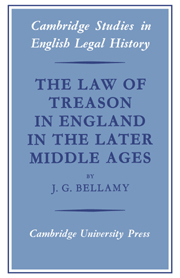Book contents
- Frontmatter
- Contents
- Editor's Preface
- Preface
- List of Abbreviations
- 1 The Medieval Concept of Treason
- 2 The Treatise Writers and the English Law of Treason at the End of the Thirteenth Century
- 3 The Origins of the English State Trial
- 4 The Great Statute of Treasons
- 5 The Scope of Treason, 1352–1485
- 6 Treason before the Courts, 1352–1485
- 7 The Origins and the Early History of the Act of Attainder
- 8 Treason and the Constitution
- Appendixes
- Select Bibliography
- Index
3 - The Origins of the English State Trial
Published online by Cambridge University Press: 14 October 2009
- Frontmatter
- Contents
- Editor's Preface
- Preface
- List of Abbreviations
- 1 The Medieval Concept of Treason
- 2 The Treatise Writers and the English Law of Treason at the End of the Thirteenth Century
- 3 The Origins of the English State Trial
- 4 The Great Statute of Treasons
- 5 The Scope of Treason, 1352–1485
- 6 Treason before the Courts, 1352–1485
- 7 The Origins and the Early History of the Act of Attainder
- 8 Treason and the Constitution
- Appendixes
- Select Bibliography
- Index
Summary
Not until the reign of Edward I did the English kings find it necessary to treat rebellion as treason. Throughout the twelfth and thirteenth centuries the levying of war against the king by his subjects, possibly the most common of later treasons, was treated with what to the modern mind seems a remarkable degree of clemency. There was no case of the execution of an earl for open rebellion between the death of Waltheof in 1076 and that of John, earl of Atholl in 1306. In its periodic disloyalty the English nobility was no worse and no better than any other similar class in western Europe, and the English kings had their moments of acute discomfort. Yet they were never provoked into the proscription of defeated partisans. It seems probable that the feudal law, which accorded a proper place to the diffidatio, and in a lesser degree the position of the kings of England as payers of homage to the kings of France, combined to protect those who levied war on the king in his realm. In contrast there were other crimes which from much earlier times had always been held as high treason and whose perpetrators on conviction had usually suffered death. They comprised as we have seen the compassing of the king's death, the procuring of his own or his armies' sedition, the affording of aid, whether tangibly or by mere advice, to his enemies. During the thirteenth century there was a tendency to punish these treasons more severely, and to the penalties of drawing and hanging were added on different occasions disembowelling, burning, beheading and quartering.
- Type
- Chapter
- Information
- The Law of Treason in England in the Later Middle Ages , pp. 23 - 58Publisher: Cambridge University PressPrint publication year: 1970
- 2
- Cited by



